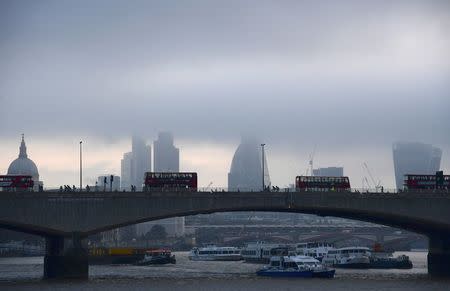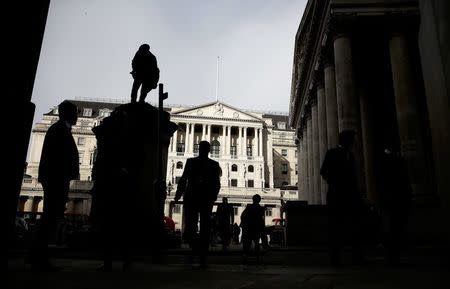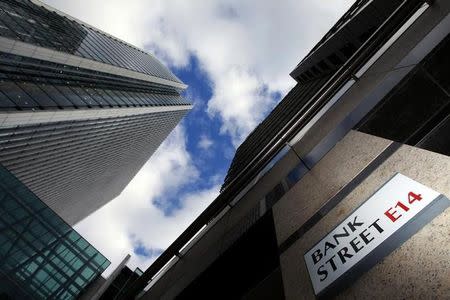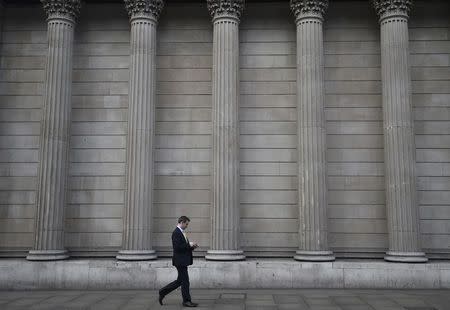Labour challenges City bankers in their fiefdom
By Andrew MacAskill and Anjuli Davies LONDON (Reuters) - Britain's Labour party, which has made a long journey leftwards since Tony Blair was leader, is looking to gain political momentum in an unlikely place: the heart of London's financial district. Labour is fighting to break the City of London's centuries-old policy of independence from party politics and end the grip of bankers on Britain's most peculiar local government, hoping for its best ever performance in elections there this week. "The aim is to shift policy in a more progressive direction," said Peter Kenyon, who is running the party's campaign in the tiny district, nicknamed 'the Square Mile'. "The aim is to see if an ancient institution can be used for the common good," said Kenyon, who worked as a political and financial journalist for Reuters until the early 1990s. The City of London, is the oldest, continuous representative local government in the world, running the area that is home to the Bank of England and St Paul's Cathedral for at least a thousand years. It is also very rich, unlike most conventional British councils which are struggling to make ends meet following deep cuts in funding from the Conservative-ruled central government. Britain's main opposition party, which currently has just one member of council, wants to use more of the City's wealth to spend on areas such as social housing and tackling air pollution rather than promoting financial services. The City is older even than the British parliament. Some of its powers, such as spending from the vast pool of cash built up over the centuries, exist outside of parliamentary control because they predate the creation of the modern nation state. The local authority officially declares its job is to reinforce the importance of financial services to the British economy and to promote those services around the world. Elections in the City, held every four years, are unlike any other in Britain because banks and other companies based there get to vote on behalf of their employees. Depending on the size of their staff, they get up to 79 votes each. The remaining voters are the borough's 7,400 residents, who are vastly outnumbered by the several hundred thousand workers who pour each weekday morning into the City, and leave again in the evening to their homes elsewhere in London and beyond. SMALL BUT RICH For most of the 20th century, official Labour policy was to abolish the area's right to govern itself but that ended after Blair became leader and dropped the pledge in 1996. He pulled the party towards the centre and pursued business-friendly policies as prime minister from 1997 till 2007. Since then, the Labour leadership has swung back to the left. The party's finance spokesman John McDonnell has called in the past for the abolition of the City's local government and for its assets to be shared. Under its current leader, veteran socialist Jeremy Corbyn, Labour lags far behind the Conservatives in national opinion polls but it has high hopes for Thursday, when it is fielding eight candidates for the lower house of the two-chamber council. Labour began contesting the City's elections after the onset of the global financial crisis. The party failed to take any seats in 2009 or four years later, but won its first seat in a by-election three years ago. Unlike other elections where Labour competes with rival parties, it will be up against independent candidates including bankers, lawyers, accountants and a film producer. The City of London is the smallest, but richest local authority in Britain, according to an analysis by Reuters. It is an autonomous fiefdom governed separately from greater London, with its eight million inhabitants. The area has about 5 billion pounds ($6.2 billion) in reserves, making it six times wealthier than Britain's largest local government in Birmingham, even though the City of London's population is 145 times smaller, an analysis by Reuters show. The City wants to fend off the entry of party politics, arguing that it will make it harder to make long-term decisions in the interests of Europe's biggest financial services hub. A spokesman for the City of London says the wealth it has built up over centuries benefits Britain as a whole. This includes spending on the arts, education and conservation. William Taylor, Labour's first elected councillor in the area, is stepping down after the elections but the party is guaranteed at least one seat - one Labour candidate has no challenger and will be elected unopposed. CITY TO BRING PEACE? If Labour can win any more seats, it will push to form an official opposition in the City's local government for the first time. Taylor said the local authority must learn the lessons of Britain's referendum vote last year to leave the European Union, when growing income inequality led to a protest against the existing economic and political way of life. "Brexit was a vote against London and the economy built around the success of financial services," he said. "The question now is: what can the City do now to bring peace?" In his district of Portsoken, residents can see the Gherkin skyscraper a few hundred metres away from the balconies of their council-owned flats, showing the divide between rich and poor. Taylor says the City's local government finds millions of pounds each year to fund lobbying for financial services and hosting sumptuous banquets for financiers and foreign heads of state, but neglects people living in his district. John Harding, a 74-year-old pensioner on the Guinness social housing estate in the City, points to a blue plastic bucket to catch the rain water coming through the ceiling in his one-bedroom flat. He says there are burglaries, drug dealing and prostitution on the estate that go unchecked. "No one takes our problems seriously," Harding says. A spokesman for the local authority says it takes the needs of residents into account as much as businesses and aims to provide housing and council services to the highest standard. Despite McDonnell's past enthusiasm for abolishing the City's local government, Labour's shadow City minister Jonathan Reynolds told Reuters this is not current party policy. "There's a particular role for the City of London in the Brexit process," he said. "They are a very good ambassador for doing business in the UK. They are an asset to the UK." So the City local government that has survived wars, plagues, fires and a couple of dozen market collapses over the last millennium looks likely to fight off any new attempts to rein in its power. It usually does. ($1 = 0.8030 pounds) (editing by David Stamp)

 Yahoo News
Yahoo News 





